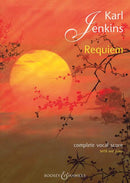| 作曲者 | Karl Jenkins (b. 1944)・ジェンキンス |
| タイトル | Requiem |
| 出版社 | Boosey & Hawkes・ブージー&ホークス |
| 楽器編成 | mixed choir (SATB) and orchestra |
| 品番 | 9790060116841 |
| 言語 | ラテン語・日本語 |
| 形状 | 110 ページ・Paperback/Soft Cover |
| 演奏時間 | 55分 |
| 出版番号 | BH 11684 |
| ISMN | 979-0060116841 |
| ISBN | 9780851624853 |
In recent years Karl Jenkins has become one of the world's best-selling living composers. He continues to conduct his epic Adiemus Live Concerts with distinguished orchestras including the London Philharmonic, featuring in Festivals and concerts in Britain and abroad; and his moving choral work The Armed Man: A Mass For Peace is now firmly lodged as a concert favourite. This new work builds on the style which the British public have come to know and adore. Jenkins has set the usual Latin movements of the requiem mass, but, in keeping with his usual trait of drawing from other cultures, he has also set five Japanese haiku ‘death’ poems. Such poems are usually to do with nature, have a single idea, and consist of seventeen syllables divided 5-7-5 over three lines. As one can see from the text, the Japanese view nature’s water cycle (precipitation) as being synonymous with life. The Western and Eastern texts are combined in two of the haiku movements, Having Seen The Moon and Farewell, which incorporate the Benedictus and the Agnus Dei respectively. Both are intoned by male voices in a monastic style as a counterpoint to the Japanese text sung by females. The instrumentation of these haiku settings includes the ancient Japanese wind instrument, the shakuhachi. Elsewhere, as usual, Jenkins has used some ethnic drums (e.g. Arabic darabuca, Japanese daiko, frame drums) and even a hip-hop rhythm in the Dies Irae!
Introit & Kyrie - Dies irae - The snow of yesterday (Gozan) - Rex tremendae - Confutatis - From deep in my heart (Issho) - Lacrimosa - Now as a spirit (Hokusai) - Pie Jesu - Having seen the moon - Lux aeterna - Farewell (Banzan) - Dona eis pacem - In paradisum



